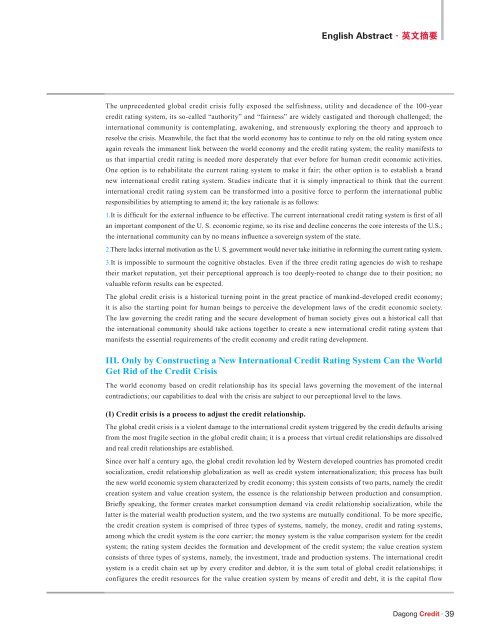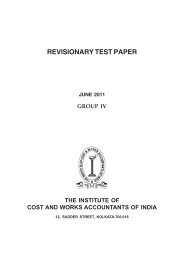Industry Info·行业资讯 - Amazon Web Services
Industry Info·行业资讯 - Amazon Web Services
Industry Info·行业资讯 - Amazon Web Services
You also want an ePaper? Increase the reach of your titles
YUMPU automatically turns print PDFs into web optimized ePapers that Google loves.
English Abstract· 英 文 摘 要<br />
The unprecedented global credit crisis fully exposed the selfishness, utility and decadence of the 100-year<br />
credit rating system, its so-called “authority” and “fairness” are widely castigated and thorough challenged; the<br />
international community is contemplating, awakening, and strenuously exploring the theory and approach to<br />
resolve the crisis. Meanwhile, the fact that the world economy has to continue to rely on the old rating system once<br />
again reveals the immanent link between the world economy and the credit rating system; the reality manifests to<br />
us that impartial credit rating is needed more desperately that ever before for human credit economic activities.<br />
One option is to rehabilitate the current rating system to make it fair; the other option is to establish a brand<br />
new international credit rating system. Studies indicate that it is simply impractical to think that the current<br />
international credit rating system can be transformed into a positive force to perform the international public<br />
responsibilities by attempting to amend it; the key rationale is as follows:<br />
1.It is difficult for the external influence to be effective. The current international credit rating system is first of all<br />
an important component of the U. S. economic regime, so its rise and decline concerns the core interests of the U.S.;<br />
the international community can by no means influence a sovereign system of the state.<br />
2.There lacks internal motivation as the U. S. government would never take initiative in reforming the current rating system.<br />
3.It is impossible to surmount the cognitive obstacles. Even if the three credit rating agencies do wish to reshape<br />
their market reputation, yet their perceptional approach is too deeply-rooted to change due to their position; no<br />
valuable reform results can be expected.<br />
The global credit crisis is a historical turning point in the great practice of mankind-developed credit economy;<br />
it is also the starting point for human beings to perceive the development laws of the credit economic society.<br />
The law governing the credit rating and the secure development of human society gives out a historical call that<br />
the international community should take actions together to create a new international credit rating system that<br />
manifests the essential requirements of the credit economy and credit rating development.<br />
III. Only by Constructing a New International Credit Rating System Can the World<br />
Get Rid of the Credit Crisis<br />
The world economy based on credit relationship has its special laws governing the movement of the internal<br />
contradictions; our capabilities to deal with the crisis are subject to our perceptional level to the laws.<br />
(I) Credit crisis is a process to adjust the credit relationship.<br />
The global credit crisis is a violent damage to the international credit system triggered by the credit defaults arising<br />
from the most fragile section in the global credit chain; it is a process that virtual credit relationships are dissolved<br />
and real credit relationships are established.<br />
Since over half a century ago, the global credit revolution led by Western developed countries has promoted credit<br />
socialization, credit relationship globalization as well as credit system internationalization; this process has built<br />
the new world economic system characterized by credit economy; this system consists of two parts, namely the credit<br />
creation system and value creation system, the essence is the relationship between production and consumption.<br />
Briefly speaking, the former creates market consumption demand via credit relationship socialization, while the<br />
latter is the material wealth production system, and the two systems are mutually conditional. To be more specific,<br />
the credit creation system is comprised of three types of systems, namely, the money, credit and rating systems,<br />
among which the credit system is the core carrier; the money system is the value comparison system for the credit<br />
system; the rating system decides the formation and development of the credit system; the value creation system<br />
consists of three types of systems, namely, the investment, trade and production systems. The international credit<br />
system is a credit chain set up by every creditor and debtor, it is the sum total of global credit relationships; it<br />
configures the credit resources for the value creation system by means of credit and debt, it is the capital flow<br />
Dagong Credit<br />
39

















